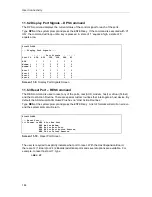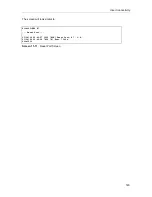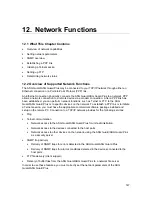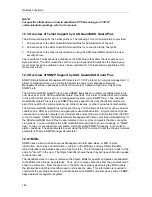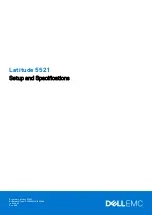
133
11. User
Connectivity
11.1 What This Chapter Contains
•
How to initiate a dial-up session
•
How to authenticate using Password/Callback, ASG Key, and Pager
•
How to access the ASG Guard/ASG Guard Plus or a host system using auto-baud and auto-
parity
•
How to join in and view host sessions in progress
•
How to determine port control parameters and status
11.2 Overview
The primary means of remotely accessing the ASG Guard/ASG Guard Plus is through a modem
connection. The ASG Guard and ASG Guard Plus have two internal modem ports (Modems 1
and 2) which can be used for the dial-up operation. In addition, an ASG Guard Plus with one or
two host expansion boards can be configured with four additional external modems attached to
the last four host ports (Refer to Chapter 5 for more details).
In order to authenticate into the ASG Guard/ASG Guard Plus via a modem connection, the
authorized user must exist or the ASG Guard/ASG Guard Plus will not allow the user access.
The user can be setup with a password to immediately gain access. The callback option provides
an even higher level of security. It is used when the ASG Guard/ASG Guard Plus is to be
accessed from either a pre-defined telephone number (regular callback) or from whichever
telephone number the user is dialing in from (variable callback). There is also an encrypted code
that can be assigned to the user, which requires the use of an ASG Key.
Once access is gained, the user can establish or join an existing session on one of the ASG
Guard/ASG Guard Plus ports, or the user can view a session dialog for an existing session on
one of the ASG Guard/ASG Guard Plus ports. Up to three users can be linked into the same
session in this manner.
11.3 Dial-up Preparations
Verify that the ASG Guard/ASG Guard Plus communications ports are configured and the user is
added according to the instructions provided in Chapters 3, 4 and 5.
If the modem Baud Rate and Char. Length/Parity parameters of the ASG Guard/ASG Guard Plus
are set to auto, the ASG Guard/ASG Guard Plus modem will match whatever speed and parity at
which you connect. You must follow the procedure outlined below in order for the ASG
Guard/ASG Guard Plus to determine the speed and parity.
Auto-Baud
When the internal modem Baud Rate parameter is set to Auto, you must press the ENTER key
several times after the modems connect and before you continue the dial in session. This
enables the ASG Guard/ASG Guard Plus internal modem to determine the speed at which your
modem is operating. Once the ASG Guard/ASG Guard Plus internal modem learns your
modem’s speed, it will begin to place the character "p" on the screen.
Summary of Contents for Lucent Technologies Access Security Gateway Guard
Page 12: ...x Page intentionally left blank ...
Page 28: ...ASG Guard Overview 16 Page intentionally left blank ...
Page 36: ...Physical Connections 24 Page intentionally left blank ...
Page 60: ...Modem Port Setup 48 Page intentionally left blank ...
Page 82: ...Modifying the User Database 70 Page intentionally left blank ...
Page 120: ...Action and Event Tables 108 Page intentionally left blank ...
Page 158: ...User Connectivity 146 Page intentionally left blank ...
Page 188: ...Log Functions 176 Page intentionally left blank ...
Page 236: ...Troubleshooting 224 Page intentionally left blank ...
Page 252: ...Internal Battery Replacement 240 Page intentionally left blank ...
Page 258: ...Glossary of Command References 246 Page intentionally left blank ...


























